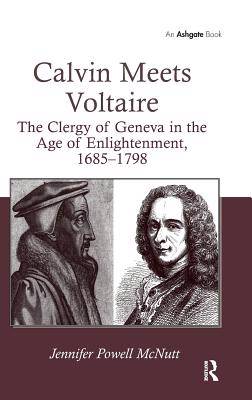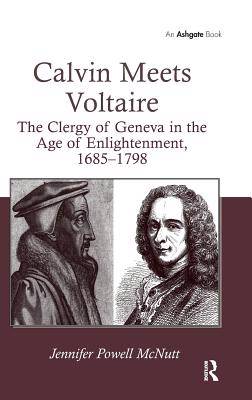
Je cadeautjes zeker op tijd in huis hebben voor de feestdagen? Kom langs in onze winkels en vind het perfecte geschenk!
- Afhalen na 1 uur in een winkel met voorraad
- Gratis thuislevering in België vanaf € 30
- Ruim aanbod met 7 miljoen producten
Je cadeautjes zeker op tijd in huis hebben voor de feestdagen? Kom langs in onze winkels en vind het perfecte geschenk!
- Afhalen na 1 uur in een winkel met voorraad
- Gratis thuislevering in België vanaf € 30
- Ruim aanbod met 7 miljoen producten
Zoeken
Calvin Meets Voltaire
The Clergy of Geneva in the Age of Enlightenment, 1685-1798
Jennifer Powell McNutt
Hardcover | Engels
€ 320,95
+ 641 punten
Uitvoering
Omschrijving
In 1754, Voltaire, one of the most famous and provocative writers of the period, moved to the city of Geneva. Little time passed before he instigated conflict with the clergy and city as he publicly maligned the memory of John Calvin, promoted the culture of the French theater, and incited political unrest within Genevan society. Conflict with the clergy reached a fever pitch in 1757 when Jean d'Alembert published the article 'Genève' for the Encyclopédie. Much to the consternation of the clergy, his article both castigated Calvin and depicted his clerical legacy as Socinian. Since then, little has been resolved over the theological position of Calvin's clerical legacy while much has been made of their declining significance in Genevan life during the Enlightenment era. Based upon a decade of research on the sources at Geneva's Archives d'Ã0/00tat and Bibliothèque de Genève, this book provides the first comprehensive monograph devoted to Geneva's Enlightenment clergy. Examination of the social, political, theological, and cultural encounter of the Reformation with the Enlightenment in the figurative meeting of Calvin and Voltaire brings to light the life, work, and thought of Geneva's eighteenth-century clergy. In addition to examination of the convergence with the philosophes, prosopographical research uncovers clerical demographics at work. Furthermore, the nature of clerical involvement in Genevan society and periods of political unrest are considered along with the discovery of a 'Reasonable Calvinism' at work in the public preaching and liturgy of Genevan worship. This research moves Geneva's narrative beyond a simplistic paradigm of 'decline' and secularization, offers further evidence for a revisionist understanding of the Enlightenment's engagement with religion, and locates Geneva's clergy squarely in the newly emerging category of the 'Religious Enlightenment.' Finally, the significance of French policy from the Revocat
Specificaties
Betrokkenen
- Auteur(s):
- Uitgeverij:
Inhoud
- Aantal bladzijden:
- 374
- Taal:
- Engels
Eigenschappen
- Productcode (EAN):
- 9781409424413
- Verschijningsdatum:
- 24/01/2014
- Uitvoering:
- Hardcover
- Formaat:
- Genaaid
- Afmetingen:
- 156 mm x 234 mm
- Gewicht:
- 703 g

Alleen bij Standaard Boekhandel
+ 641 punten op je klantenkaart van Standaard Boekhandel
Beoordelingen
We publiceren alleen reviews die voldoen aan de voorwaarden voor reviews. Bekijk onze voorwaarden voor reviews.









